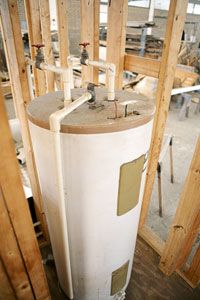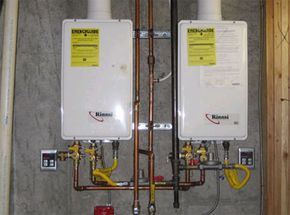Deciding what kind of tankless water heater to go with depends on a couple of things:
- The flow rate, or amount of water you'll need heated at one time
- Temperature rise, or the difference between your groundwater temperature and the desired output temperature
The Federal Energy Policy Act of 1992 set flow limits at 2.2 gallons per minute (GPM) at 60 pounds per square inch (PSI) for household water fixtures [source: U.S. Dept. of Energy]. Some people also use aerators to further limit the flow of water. Tankless manufacturers size their units based on the temperature rise needed for a given flow rate.
To calculate your flow rate, add up the GPM for the household water fixtures you'll need at one time:
- Bathroom faucet - low-flow faucets use 0.5-1.5 GPM. Standard post-1992 fixtures are set at 2.2 GPM. Faucets before 1992 fall between 3.0 and 5.0 GPM.
- Kitchen faucet - pre-1992 fixtures use between 3.0-7.0 GPM. The post-1992 standard remains 2.2 GPM, and kitchen faucets don't use aerators, so there are no low-flow numbers.
- Shower - low flow rate is between 1.0-2.0 GPM. The 1992 standard remains 2.2 GPM. Pre-1992 heads fall between 4.0-8.0 GPM.
Now figure out your temperature rise by calculating the difference between the temperature of your groundwater and what you'd like the end result to be. For instance, if you have a groundwater temperature of 70 degrees and you like your showers to be a pleasant 110 degrees, that's a rise of 40 degrees. Your ground water temperature is roughly the same as your average yearly air temperature.
Once you have your temperature rise and know your flow rates, then you know what size and what kind of water heater will work best for your needs. It's important to remember in this calculation that you'll be measuring the amount of hot water you'll need at one time. Tankless systems never run out of hot water, but if you want to turn on every fixture in your house at the same time, the hot water will be split among them. So estimate the number of fixtures you think you'd need at one time -- chances are it won't be every fixture.
Let's say you live in an older home that has been partially remodeled. You estimate that you'll need to heat water for your kitchen faucet, one bathroom faucet and two shower heads at one time. One of the shower heads is newer and meets the 1992 standard, while the other is older and has a flow rate of roughly 5.0. The rest of your fixtures also meet the 2.2 standard. Add 2.2 + 2.2 + 2.2 and 5.0 for a total flow rate of 11.6. You live in Miami, so your groundwater temperature is roughly 72 degrees and you like your showers at 100 degrees. This means you should look for a tankless system that can heat 11.6 GPM at a rise of 28 degrees.
Gas- and propane-powered heaters typically provide more juice than electric models and are generally used for whole-house systems. Electric models are more common in point-of-use scenarios, although sometimes people prefer to use two electric heaters in parallel instead of one larger gas-powered unit. If you want a shower in your pool house or hot water for an outdoor kitchen, you might be a good candidate for a small electric tankless heater.
In the next section we'll look into some of the benefits and negative aspects of going tankless.




